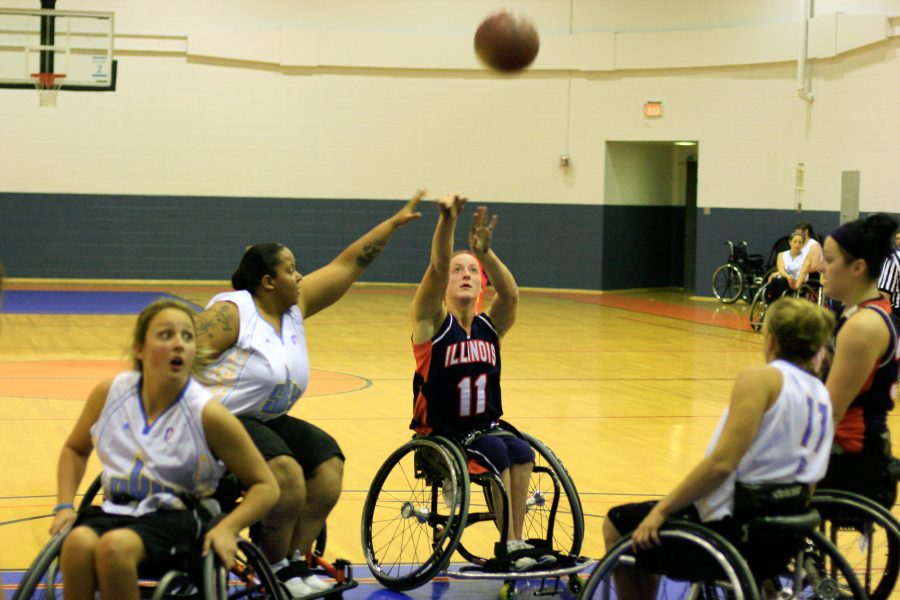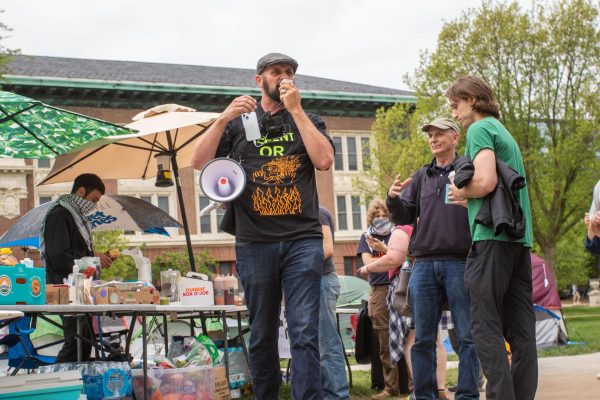Pasta and corn keys for Tatyana McFadden in Rio
Chris Davis The Daily Illini Illinois’ Tatyana McFadden (11) shoots the ball during the wheelchair basketball game against Chicago Sky for the Illini Classic Wheelchair Basketball Tournament that was held in the ARC on Saturday, November 7, 2009.
September 22, 2016
To get to the Rio 2016 Paralympics, Tatyana McFadden had to push through cornfields — literally.
Illinois wheelchair track intern Mike Groves said she could reach speeds of 25 miles per hour on the straightaway of a country road at practice.
McFadden and her wheelchair track teammates. They push around a track in the morning and then average 10 miles on Champaign back roads everyday.
“We just get lost in cornfields a lot,” teammate Jill Moore said after a 10.2-mile jaunt.
Moore said the team plays a “big game of chicken” on the rare occasions when a car comes through. Otherwise, it’s the team’s territory, and the local residents have come to expect the Paralympic medalist to zoom by.
Get The Daily Illini in your inbox!
The Illinois wheelchair track team will split into groups depending on each other’s upcoming events and personal goals. Some will train for longer distances, like marathons, and others aim for shorter treks, like 100 meters.
McFadden has won the Chicago, London, Boston and New York marathons each of the past three years to complete the Marathon Grand Slam.
Her group will increase their distance around Champaign in increments and eventually work their way up to 26.2 miles.
Moore said that two Illinois racers even pushed from Los Angeles to New York in 72 days last year and reached a top speed of 60 miles per hour in Colorado.
McFadden was less than one-hundredth of a second from adding to her list of marathons titles at the Rio Paralympics: She came just behind China’s Lihong Zou at 1 hour, 38 minutes, 44 seconds.
McFadden competed in seven events, including the 100 meters, 400 meters, 800 meters, 1,500 meters, 5,000 meters, 4 x 400 meters and the marathon. Counting the prelims, she raced in 14 events, totaling the equivalent of 582.51 football fields, in 10 days.
Moore competed in the 2015 Parapan Games and raced in the 100 meters, 800 meters and 400 meters. She finished fourth, fifth and sixth, respectively.
She estimates she could do about half of McFadden’s workload in Rio.
“To compete in that many events … that’s a new-level kind of thing,” Moore said.
“Tat,” as the Illinois wheelchair racers call McFadden, medalled in six of her seven events with four gold and two silver.
“To do well in all of those, that’s just a special kind of athlete,” Moore said. “I don’t think she’s human.”
McFadden must follow a strict diet to maintain her otherworldly achievements.
She, like all her teammates, have to do what Moore calls “carbo-loading” before a race, especially a marathon.
Carbo-loading refers to eating foods high in carbohydrates to provide the body with enough energy for the race.
“A good pasta meal is always planned,” Moore said.
The team works closely with team dietician Liz Broad and alum Susannah Scaroni to stay healthy, well-rested and hydrated.
Scaroni studied dietetics at Illinois and competed in the Rio 2016 Paralympics marathon and the 800 meters alongside McFadden. Scaroni finished seventh in the marathon but did not reach the 800-meter finals.
The Illinois racers also keep their eyes on injuries, especially in their shoulders, backs and ribs if their bodies are not completely loose.
Moore posted in 2012 on her personal website, ‘The Case For Umbrella Hats,” a video of the bloody blisters she developed from racing.
The para-athletes wear 3-D-printed gloves to prevent cuts and attach a patch to their bodies that sends an electric current through their muscles to give them an internal massage-like feeling, said Moore.
Moore said injuries have not been a problem for McFadden.
“Her sport is so refined,” Moore said. “She knows her body in and out.”
McFadden made her Paralympic debut at the age of 15 in the 2004 Athens games and has won 18 medals since.
“A lot of people saw Paralympic sports as kind of an inclusion activity, but in reality, we’re here to bring it,” Moore said.
“We’re competitors, and we’re working hard, if not harder, to be there.”
[email protected] @32Ryno







